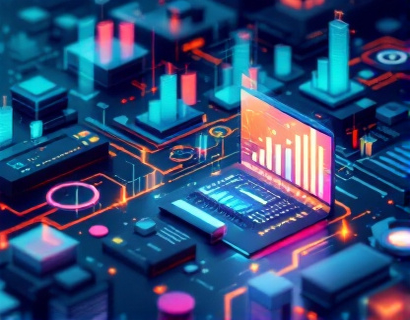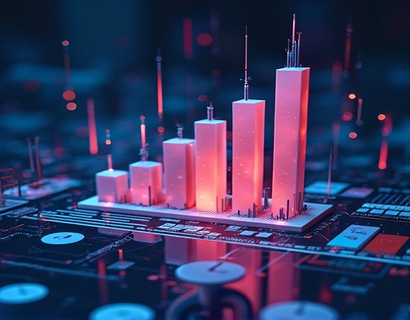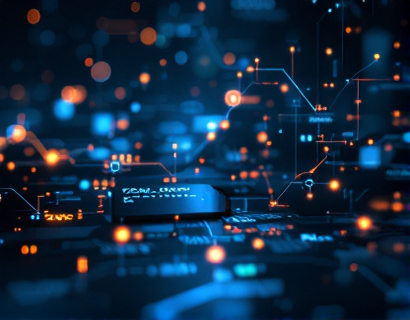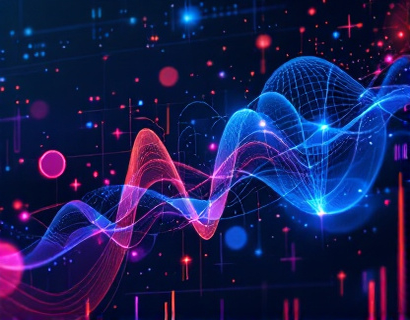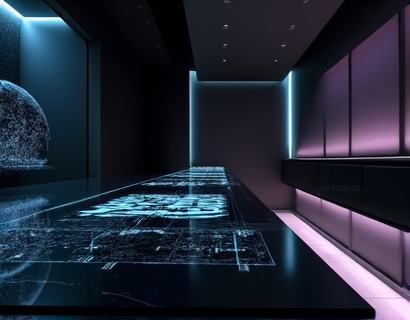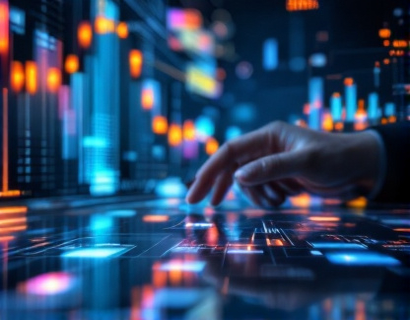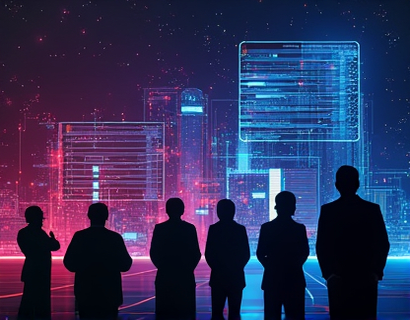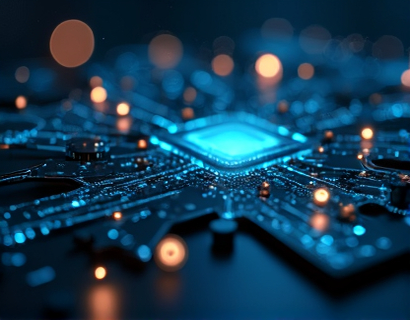AI and Crypto: Pioneering a New Era of Digital Transformation
The intersection of artificial intelligence and cryptocurrency is giving birth to a new paradigm in digital interactions. This fusion is not just a technological curiosity but a transformative force that is redefining user experiences across various sectors. As we stand on the cusp of this digital revolution, it's essential to explore how these advanced technologies are converging to create more efficient, intuitive, and seamless interactions. This article delves into the cutting-edge integration of AI and blockchain, highlighting the profound impact on service delivery and the broader digital landscape.
The advent of blockchain technology has already disrupted traditional industries by providing a decentralized, secure, and transparent way to conduct transactions. When combined with AI, the potential for innovation becomes even more profound. AI's ability to process vast amounts of data, learn from patterns, and make decisions autonomously complements blockchain's strengths in security and transparency. Together, they form a powerful duo that can revolutionize how we interact with digital services.
Enhanced Security through AI-Driven Blockchain Solutions
One of the primary benefits of integrating AI with blockchain is the enhancement of security measures. Traditional blockchain systems rely on cryptographic algorithms to secure transactions, but the increasing sophistication of cyber threats necessitates more advanced protective mechanisms. AI can analyze patterns and detect anomalies in real-time, identifying potential security breaches before they occur. Smart contracts, which are self-executing contracts with the terms directly written into code, can be fortified with AI to adapt and respond to new threats dynamically. This synergy ensures that the blockchain remains a robust and secure platform for transactions and data storage.
For instance, AI-powered monitoring systems can continuously scan blockchain networks for suspicious activities, such as unusual transaction patterns or unauthorized access attempts. Machine learning algorithms can be trained to recognize these anomalies and trigger alerts or automated responses to mitigate risks. This proactive approach to security not only protects users' assets but also builds trust in the blockchain ecosystem, encouraging more widespread adoption.
Personalized User Experiences through AI-Driven Insights
AI's capability to analyze and interpret complex data sets can be harnessed to create highly personalized user experiences on blockchain-based platforms. By leveraging user data, AI can offer tailored recommendations, streamline processes, and enhance overall usability. In the context of cryptocurrency and blockchain, this means that users can enjoy a more intuitive and user-friendly interface, reducing the learning curve and making these technologies more accessible to the general public.
For example, AI-driven chatbots can provide instant support and guidance to users navigating blockchain applications. These chatbots can understand natural language queries, offer step-by-step instructions, and even predict user needs based on past interactions. This level of personalization not only improves user satisfaction but also increases engagement and retention, crucial factors for the success of any digital platform.
Optimized Transaction Processing with AI
Transaction processing is a critical aspect of blockchain technology, and AI can significantly optimize this process. Traditional blockchain networks often face scalability issues, with transaction times and fees becoming bottlenecks as usage increases. AI can help alleviate these problems by optimizing transaction routing, validating processes, and managing network congestion.
Machine learning algorithms can analyze network traffic patterns and predict peak usage times, allowing the system to dynamically adjust resources to maintain optimal performance. Additionally, AI can assist in the development of more efficient consensus mechanisms, reducing the computational power required for transaction validation. This not only speeds up transaction times but also lowers energy consumption, making blockchain more sustainable and environmentally friendly.
Smart Contract Automation and AI Enhancements
Smart contracts are a cornerstone of blockchain technology, automating and enforcing contractual obligations without the need for intermediaries. However, the true potential of smart contracts is unlocked when combined with AI. AI can enhance the functionality and reliability of smart contracts by adding layers of intelligence and adaptability.
For instance, AI can be used to analyze and interpret the terms of smart contracts, ensuring that all conditions are met and that the contract executes as intended. Machine learning models can also predict potential issues or loopholes in the contract logic, allowing developers to refine and improve the contracts before deployment. Furthermore, AI can enable smart contracts to adapt to changing circumstances, such as market fluctuations or user behavior, making them more flexible and responsive.
Consider a scenario in the insurance industry, where a smart contract is triggered by specific events like accidents or natural disasters. An AI-enhanced smart contract can assess the situation in real-time, verifying the authenticity of the event and determining the appropriate compensation. This not only speeds up the claims process but also reduces the risk of fraud, as AI can detect and flag suspicious activities.
Decentralized Finance (DeFi) and AI-Driven Innovations
Decentralized Finance (DeFi) is a rapidly growing sector that leverages blockchain technology to provide financial services without traditional intermediaries. AI plays a pivotal role in enhancing DeFi platforms by offering advanced analytical tools, risk management solutions, and personalized financial services. The combination of AI and DeFi can lead to more efficient, transparent, and accessible financial systems.
AI-driven analytics can process vast amounts of financial data to identify trends, predict market movements, and assess investment risks. This information can be invaluable for users making informed decisions about their investments. Additionally, AI can automate trading strategies, execute transactions, and manage portfolios, providing a level of efficiency and accuracy that is difficult to achieve manually.
Risk management is another area where AI can significantly impact DeFi. By analyzing historical data and real-time market conditions, AI can identify potential risks and suggest mitigation strategies. This proactive approach helps maintain the stability and integrity of DeFi platforms, fostering greater trust and adoption among users.
Supply Chain Transparency and Traceability
The supply chain industry stands to benefit immensely from the integration of AI and blockchain. AI can enhance the transparency and traceability of goods as they move through the supply chain, ensuring authenticity and compliance with regulations. Blockchain provides a immutable and transparent ledger of transactions, while AI can analyze this data to identify patterns, optimize logistics, and detect fraudulent activities.
For example, AI can track the origin and journey of products, from manufacturing to delivery, ensuring that each step adheres to quality and safety standards. This level of transparency not only builds consumer trust but also helps businesses comply with regulatory requirements. AI can also predict potential bottlenecks and optimize routes, reducing costs and improving efficiency.
In the context of luxury goods, AI and blockchain can together create a verifiable and tamper-proof history of each item, preventing counterfeiting and ensuring authenticity. This is particularly important for high-value items where the risk of fraud is significant.
Healthcare and AI-Enhanced Blockchain Solutions
The healthcare sector is another area where the combination of AI and blockchain can drive significant improvements. Patient data security, interoperability of health records, and efficient drug supply chains are just a few of the challenges that can be addressed through this synergy. AI can enhance the security and privacy of health data stored on blockchain platforms, while also enabling seamless data sharing among healthcare providers.
AI-driven analytics can process and interpret medical data to provide insights for diagnosis, treatment, and research. Blockchain ensures that this data is securely stored and accessed only by authorized personnel, maintaining patient privacy and compliance with regulations like HIPAA. AI can also optimize drug supply chains by tracking the movement of pharmaceuticals, ensuring they are genuine and have not been tampered with.
Telemedicine platforms can benefit from AI-powered chatbots that provide initial consultations and triage, reducing the burden on healthcare professionals. These chatbots can also guide patients through the process of accessing and managing their health records on a blockchain, empowering them to take control of their healthcare data.
Challenges and Considerations
While the potential benefits of integrating AI and blockchain are substantial, there are also challenges and considerations that must be addressed. One of the primary concerns is the complexity of developing and implementing these advanced technologies. Both AI and blockchain require specialized knowledge and expertise, which can be a barrier for smaller organizations.
Another challenge is the issue of scalability. As the adoption of AI and blockchain grows, ensuring that these systems can handle increasing amounts of data and transactions without compromising performance is crucial. Additionally, there are regulatory and ethical considerations to navigate, particularly around data privacy and the potential for AI bias.
To overcome these challenges, collaboration between technologists, policymakers, and industry stakeholders is essential. Developing standardized frameworks and best practices can help streamline the integration process and ensure that the benefits of AI and blockchain are realized across various sectors.
Conclusion
The convergence of AI and blockchain is ushering in a new era of digital innovation, where user experiences are transformed through enhanced security, personalization, and efficiency. As these technologies continue to evolve, the possibilities for transformation are vast, spanning from finance and healthcare to supply chain and beyond. By embracing this digital revolution, we can create a more connected, secure, and intuitive digital landscape for all.
























